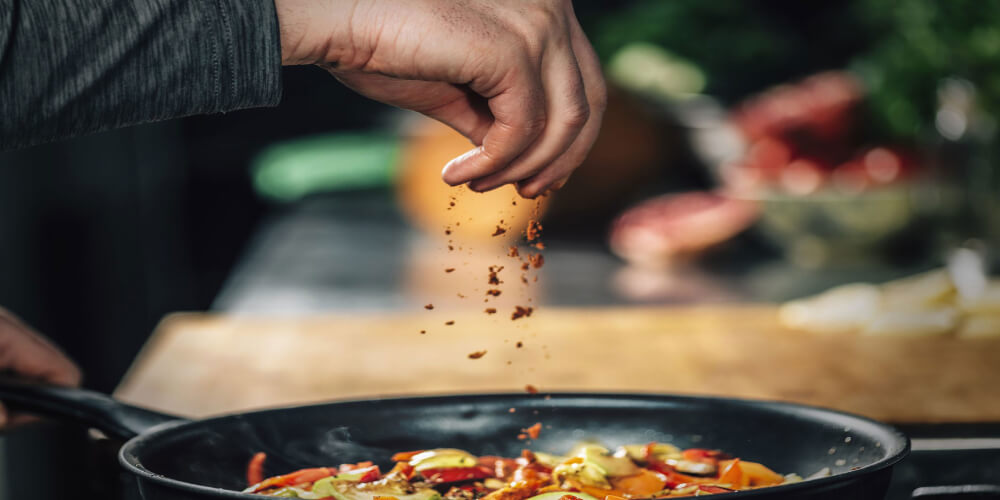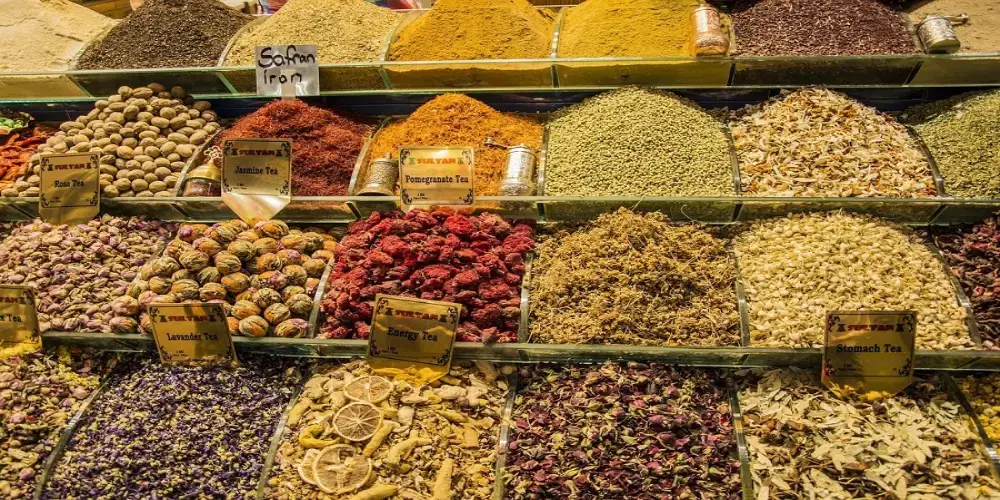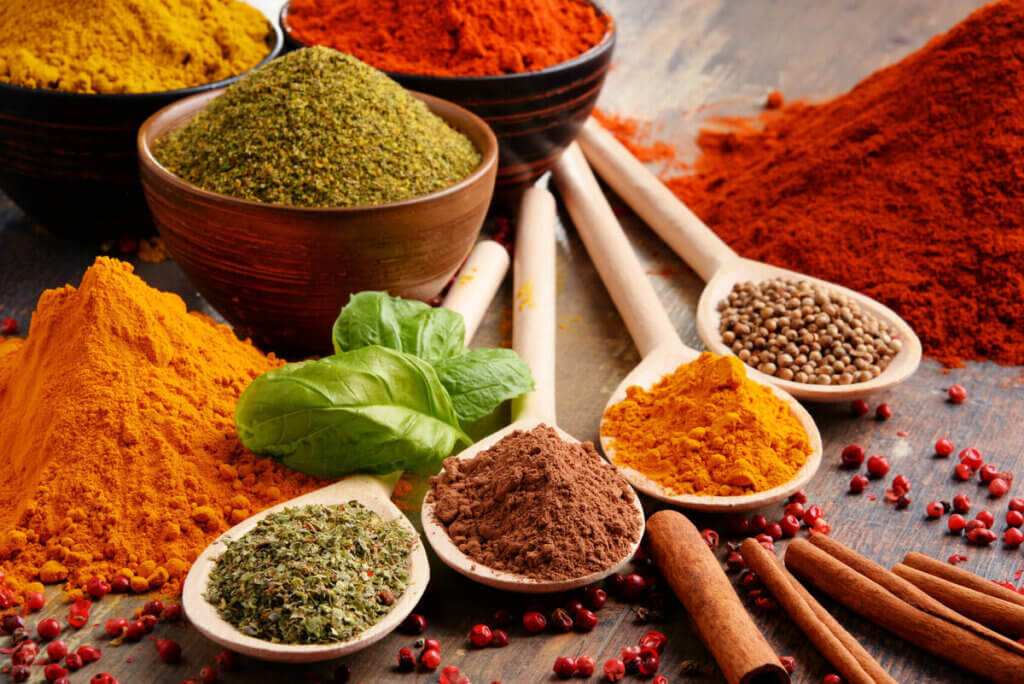Do you ever hold a spice in your hand, astonished by its bold flavor and aroma, and wonder what made it land in your pantry? Most Mediterranean spices in your pantry have a rich history and unique background. Each spice brings a piece of the Mediterranean’s diverse cultures and traditions, consequently adding depth to your cooking. In this blog, we’ll explore the Mediterranean spices and blends that are a must-have for any pantry. Let’s dive in!
Top Mediterranean Spices and Their Uses
You will be surprised by how many spices in your pantry come from the Mediterranean region. The coast is renowned for its vibrant dishes, and the cuisine owes much of its unique taste to the Middle Eastern spices and herbs used. Moreover, these spices bring depth to the Mediterranean dishes that we all love fondly. Below are some of the most popular Mediterranean herbs:
- Basil: Basil is native to the regions of Southeast Asia and Central Africa. Basil is the go-to herb for adding a refreshing note to any dish. Its sweet and aromatic flavor brightens up salads, pasta, sauces, soups, and more.
- Thyme: The thyme plant is native to the Mediterranean region. Want to add warmth to your dishes? Use thyme! This earthy herb enhances not only Mediterranean stews but also grilled meats and vegetables.
- Oregano: Oregano is a perennial Mediterranean herb—a crowd favorite, and rightfully so. The quintessential Mediterranean herb, oregano, is widely used in Greek salads, marinades, and pizzas for an earthy taste.
- Sumac: Sumac is made from ground and dried berries of the Rhus plant. Its tangy, citrusy flavor pairs amazingly with grilled meats, vegetables, and rice dishes. Sumac is a Middle Eastern favorite because it is a well-rounded spice that elevates any dish.
- Cumin: Cumin most commonly grows in dry and warm regions such as India, Iran, Egypt, Syria, and Turkey. It adds complexity to any dish. It is a warm, nutty spice used extensively in Middle Eastern and Mediterranean cooking, particularly in hummus, stews, and marinades.
The Best Mediterranean Spice Blends
Za’atar
Za’atar is a widely used Mediterranean spice blend. It combines thyme, oregano, marjoram, sesame seeds, and sumac and is known for its earthy and tangy taste. Za’atar is extensively used in Middle Eastern and Mediterranean dishes, combining aromatic and bold spices to create a unique flavor profile. It can be sprinkled on flatbreads, grilled vegetables, or meats or used as a seasoning for hummus. Moreover, it is a popular addition to savory and sweet recipes, making it the culmination of rich, flavorful ingredients. Try the zaatar bread at Albaraka Market & Grill for an authentic taste.
Ras el Hanout
This Moroccan spice mix typically contains over 20 ingredients. It includes cumin, coriander, cinnamon, turmeric, and cloves. In fact, the name translates to “head of the shop,” implying the best spices a seller has to offer. Known for its bold, warm, and slightly sweet flavor, Ras el Hanout is commonly used in stews, tagines, couscous, and meats. It adds depth and complexity to dishes, combining earthy, sweet, and savory notes in a single blend. Therefore, these qualities make Ras el Hanout a must-have for any pantry.
Dukkah
Dukkah is an Egyptian spice and nut blend. Traditionally, it combines toasted sesame seeds, cumin, coriander, and nuts like almonds or hazelnuts. Dukkah has a unique combination of textures and flavors, making it an excellent addition to various dishes. While commonly used as a dip for bread with olive oil, it’s also fantastic for sprinkling on roasted vegetables, meats, and salads. This versatility of Dukkah allows it to enhance simple and complex meals, adding a distinct and aromatic touch to any dish.
Feel the bold impact Mediterranean spice blends have on food. With such vibrant flavors, keeping these blends in your pantry is essential. Even better, you can mix and match your favorite spices to craft a personalized blend tailored to your taste. As a result, you can enjoy a unique Mediterranean spice blend that reflects your preferences and brings a fresh twist to your cooking.
How to Use Mediterranean Spices in Your Cooking

Mediterranean spices are the way to go if you’re looking for a way to make vibrant and flavorful dishes with minimum effort. Whether preparing a simple meal or an elaborate feast, these spices bring warmth, depth, and unique character to your kitchen.
Basil
Basil’s slightly sweet and aromatic flavor makes it perfect for fresh and light dishes:
- Add fresh basil leaves to pasta, pizza, or bruschetta.
- Blend into homemade pesto with olive oil, garlic, and pine nuts.
- Use dried basil to season tomato sauces or roasted vegetables.
Thyme
Thyme has a warm, earthy taste that complements both hearty and delicate dishes:
- Sprinkle thyme over roasted chicken, potatoes, or lamb for a herby finish.
- Add it to soups, broths, or tomato-based stews for an aromatic lift.
- Use it in marinades for fish or vegetables.
Oregano
Oregano’s bold, earthy flavor is a staple in Mediterranean cooking:
- Mix oregano into marinades for meats, fish, or grilled vegetables.
- Sprinkle it over pizzas, flatbreads, and sauces for a classic touch.
- Mix lemon juice, olive oil, and oregano for a simple salad dressing.
Sumac
Sumac’s tangy, citrus-like notes can brighten up both savory and sweet dishes:
- Dust sumac over grilled meats, fish, or roasted vegetables.
- Add it to rice dishes or couscous for a pop of color and flavor.
- Use sumac as a garnish for creamy dips like hummus or yogurt-based sauces.
Cumin
Cumin’s warm, nutty profile adds complexity to a variety of dishes:
- Stir cumin into lentil soups, chickpea stews, or tagines.
- Mix with garlic, olive oil, and paprika for a spice rub on meats.
- Add a pinch to roasted carrots, sweet potatoes, or eggplant.
Za’atar
Za’atar blends the richness of fresh herbs, sumac, and sesame seeds. Use it to:
- Sprinkle on flatbreads, dips, or yogurt.
- Season grilled vegetables, meats, or seafood.
- Mix with olive oil for a quick marinade or dipping sauce.
Ras el Hanout
This Moroccan blend of spices like cumin, coriander, and cinnamon adds warmth and depth:
- Use it to flavor tagines, couscous, or hearty stews.
- Add to roasted meats or vegetables for a complex flavor profile.
Dukkah
Dukkah combines spices with toasted nuts for a crunchy texture:
- Serve as a dip with olive oil and warm bread.
- Use to coat grilled chicken or fish.
- Sprinkle on roasted vegetables or salads for a nutty finish.
With Mediterranean spices in your pantry, every dish can be an opportunity to test new flavors. You can combine different Mediterranean spices to create a new spice tailored to your taste.
How to Stock and Store Mediterranean Spices

From spices for Mediterranean salads to halal spices for Mediterranean cooking, these versatile flavors have something for everyone. Fresh spices are key to enhancing the authenticity of your Mediterranean dishes. Here’s how you can buy and store them for longevity:
- Choose Fresh, High-Quality Spices: Opt for whole spices whenever possible when purchasing Mediterranean spices. Whole spices, such as cumin seeds or cinnamon sticks, retain their oils and flavors longer than pre-ground varieties. Purchase from reputable stores specializing in spices, such as Al Baraka Market, to ensure they are as fresh as they come.
- Use Airtight Containers: Store your spices in airtight containers to prevent air exposure. This prevents them from losing their flavor. Airtight glass jars are a great option as they are non-reactive and protect the spices from moisture.
- Keep Spices Away from Heat and Light: Store your Mediterranean spices in a cool, dark place away from direct sunlight to prevent spoiling the oils and flavors. A pantry or kitchen cabinet works well. Avoid storing spices near stoves or ovens, where heat can quickly cause them to lose potency.
- Label Your Spices: Label your spice containers with the name and purchase date for easy identification. This helps you keep track of freshness and ensure you use them before they lose flavor.
- Grind Fresh When Needed: While pre-ground spices are convenient, grinding spices as needed from whole seeds or pods releases more oils and yields more vibrant flavors.
By following these tips, you can maintain the integrity of your Mediterranean spices, ensuring they continue to elevate your dishes with their bold and aromatic flavors.
Conclusion
Mediterranean spices and blends are the secret to transforming everyday dishes into a love letter to the coast. Moreover, a Mediterranean spice kit is an excellent way to have exotic spices that add a homey love to your meals. Additionally, stocking your pantry with these must-have spices and storing them properly ensures every dish is packed with authentic, fresh flavors. The possibilities are endless with the right spices, so head over to Al Baraka Market & Grill now to stock up on your favorite Middle Eastern spices and herbs.
